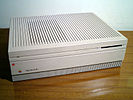
The Motorola 68030 ("sixty-eight-oh-thirty") is a 32-bit microprocessor in the Motorola 68000 family. It was released in 1987. The 68030 was the successor to the Motorola 68020, and was followed by the Motorola 68040. In keeping with general Motorola naming, this CPU is often referred to as the 030.

The Motorola 68040 ("sixty-eight-oh-forty") is a 32-bit microprocessor in the Motorola 68000 series, released in 1990. It is the successor to the 68030 and is followed by the 68060, skipping the 68050. In keeping with general Motorola naming, the 68040 is often referred to as simply the '040.

The Power Macintosh, later Power Mac, is a family of personal computers designed, manufactured, and sold by Apple Computer, Inc as the core of the Macintosh brand from March 1994 until August 2006.
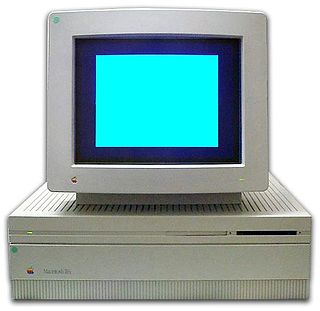
The Macintosh IIfx is a personal computer designed, manufactured and sold by Apple Computer from March 1990 to April 1992. At introduction it cost from US$9,000 to US$12,000, depending on configuration, and it was the fastest Macintosh available at the time.

The Macintosh SE/30 is a personal computer designed, manufactured and sold by Apple Computer from January 1989 to October 1991. It is the fastest of the original black-and-white compact Macintosh series.

The Macintosh IIci is a personal computer designed, manufactured, and sold by Apple Computer, Inc. from September 1989 to February 1993. It is a more powerful version of the Macintosh IIcx, released earlier that year, and shares the same compact case design. With three NuBus expansion slots and a Processor Direct Slot, the IIci also improved upon the IIcx's 16 MHz Motorola 68030 CPU and 68882 FPU, replacing them with 25 MHz versions of these chips.

The Macintosh LC is a family of personal computers designed, manufactured and sold by Apple Computer, Inc. from 1990 to 1997.

The Macintosh IIx is a personal computer designed, manufactured, and sold by Apple Computer from September 1988 to October 1990. This model was introduced as an update to the original Macintosh II, replacing the 16 MHz Motorola 68020 CPU and 68881 FPU with a 68030 CPU and 68882 FPU running at the same clock speed. The initial price of the IIx was US$7,769 or US$9,369 for the version with a 40 MB hard drive.

Macintosh Centris is a family of personal computers designed, manufactured and sold by Apple Computer, Inc. in 1992 and 1993. They were introduced as a replacement for the six-year-old Macintosh II family of computers; the name was chosen to indicate that the consumer was selecting a Macintosh in the center of Apple's product line. Centris machines were the first to offer Motorola 68040 CPUs at a price point around US$2,500, making them significantly less expensive than Quadra computers, but also offering higher performance than the Macintosh LC computers of the time.
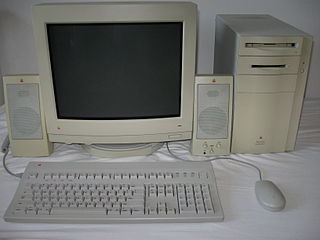
The Macintosh Quadra is a family of personal computers designed, manufactured and sold by Apple Computer, Inc. from October 1991 to October 1995. The Quadra, named for the Motorola 68040 central processing unit, replaced the Macintosh II family as the high-end Macintosh model.

A processor direct slot (PDS) is a slot incorporated into many older Macintosh models that allowed direct access to the signal pins of a CPU, similar to the functionality of a local bus in PCs. This would result in much higher speeds than having to go through a bus layer, such as NuBus, which typically ran at a slower 10 MHz speed.

The Macintosh IIvx is a personal computer designed, manufactured and sold by Apple Computer from October 1992 to October 1993. It is the last of the Macintosh II family of Macintosh computers. The IIvx was introduced at the same time as the Macintosh IIvi, with both models using the same metal case design as the earlier Performa 600 and Performa 600CD. Like the Performa 600CD, the IIvx could be equipped with an internal double-speed CD-ROM drive.

The Macintosh IIvi is a personal computer designed, manufactured, and sold by Apple Computer from September 1992 to February 1993. The IIvi was introduced alongside the Macintosh IIvx, using a slower Motorola 68030 processor and no floating point unit. The Performa 600 models, meanwhile, are the IIvi with the IIvx's 32 MHz CPU. The IIvi was, on some benchmarks, faster than the IIvx. It is the only model in the Macintosh II family to be branded as a Performa.
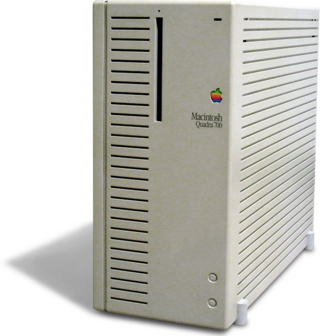
The Macintosh Quadra 700 is a personal computer designed, manufactured and sold by Apple Computer from October 1991 to March 1993. It was introduced alongside the Quadra 900 as the first computers in the Quadra series using Motorola 68040 processor, in order to compete with IBM compatible PCs powered by the Intel i486DX. The Quadra 700 is also the first computer from Apple to be housed in a mini-tower form factor, which in 1991 was becoming a popular alternative to standard desktop-on-monitor cases that were common through the 1980s.

The Macintosh Quadra 605 is a personal computer designed, manufactured, and sold by Apple Computer from October 1993 to July 1996. The model names reflect a decision made at Apple in 1993 to follow an emerging industry trend of naming product families for their target customers – Quadra for business, LC for education, and Performa for home. Accordingly, the Performa 475 and 476 was sold in department stores and electronics stores such as Circuit City, whereas the Quadra was purchased through an authorized Apple reseller.
DayStar Digital, Inc., was a company founded in 1983 by Andrew Lewis as a subcontract manufacturer of electronic assemblies and circuit boards. In 1986, the company released memory upgrades for Apple Macintosh (Mac) computers as its first products, and in 1987, DayStar began to market processor upgrades exclusively for the Mac, the first being for the Apple Macintosh II computer. The company focused exclusively on this market for the full range of Mac computers through 1995, utilizing the Motorola 68030, 68040 and PowerPC 601 processors. These upgrades were installed directly into the Processor Direct Slot of various Macintosh platforms, as on the Macintosh IIci, or via an adapter. DayStar became known as the leading "speed shop" for Macintosh computer systems; it won virtually every Mac editorial award given for product excellence and had the top rated brand among peripheral manufacturers. The company also formed unique strategic relationships with many companies including Apple, IBM and Adobe. In 1995, DayStar was one of three companies in the world awarded licenses by Apple to "clone" the Macintosh computer.
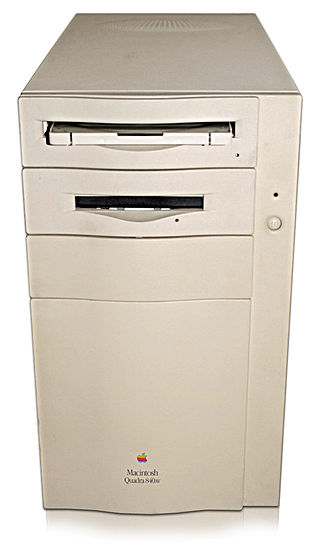
The Macintosh Quadra 840AV is a personal computer designed, manufactured, and sold by Apple Computer from July 1993 to July 1994. It was introduced alongside the Centris 660AV, where "AV" signifies audiovisual capabilities, such as video input and output, telecommunications, speech recognition, and enhanced audio. The 840AV has the same mini-tower form factor as the Quadra 800, with a faster Motorola 68040 processor.

The Macintosh Quadra 660AV, originally sold as the Macintosh Centris 660AV, is a personal computer designed, manufactured and sold by Apple Computer from July 1993 to September 1994. It was introduced alongside the Quadra 840AV; the "AV" after both model numbers signifies video input and output capabilities and enhanced audio.
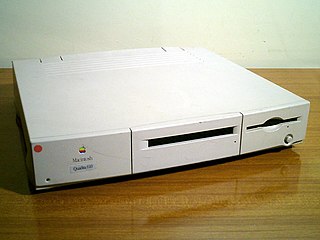
The Macintosh Quadra 610, originally sold as the Macintosh Centris 610, is a personal computer designed, manufactured and sold by Apple Computer from February 1993 to July 1994. The Centris 610 was introduced alongside the larger Centris 650 as the replacement for the Macintosh IIsi, and it was intended as the start of the new midrange Centris line of computers. Later in 1993, Apple decided to follow an emerging industry trend of naming product families for their target customers – Quadra for business, LC for education, and Performa for home – and folded the Centris 610 into the Quadra family.

The Macintosh Quadra 650, originally sold as the Macintosh Centris 650, is a personal computer designed, manufactured and sold by Apple Computer from February 1993 to September 1994. The Centris 650 was introduced alongside the smaller Centris 610 as the replacement for the Macintosh IIci and Quadra 700, and it was intended as the start of the new midrange Centris line of computers. Later in 1993, Apple decided to follow an emerging industry trend of naming product families for their target customers – Quadra for business, LC for education, and Performa for home – and folded the Centris 650 into the Quadra family.


